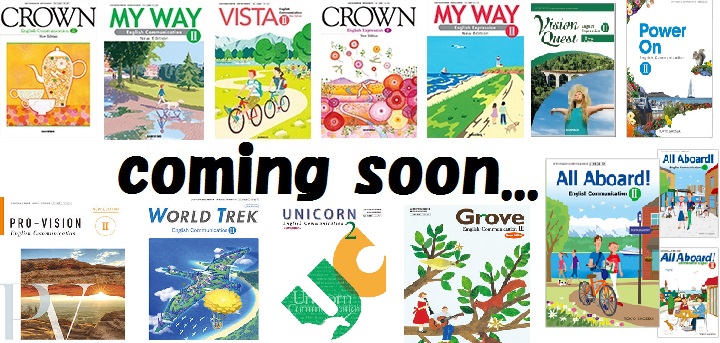
【H30改訂版】英表Ⅱ be English ExpressionⅡ いいずな書店(332)Lesson1 解答
Lesson 1
Warm-Up (p.9)
私がやってみたいこと
私が子どものころ,私たち一家は日本のいくつかの場所に住みました。そのうちに,私
は日本の歴史,地理,そして人々に興味を持つようになりました。私たちは自分の国につ
いて知り,外国から来る人たちに説明できるようになるべきだと思います。私は日本につ
いてさらに多くを学び,外国の観光客のための旅行ガイドとしてボランティアをすること
にしました。このようにして,人々が日本をよりよく理解する手助けをしようと思います。
Grammar and Expressions (p.10)
① 祖父は毎朝,散歩をする。
② この夏の京都旅行を計画しているところです。
あなたの気持ちはわかります。
今日は調子がよさそうですね。
飛行機は何時に成田に到着しますか。
今日の放課後,あなたは何をしますか。
③ 昨日,メールアドレスを変えました。
私は彼が正しいと思った。
私は昨日のこの時間は夕飯を食べていた。
父はかつて喫煙していた。
④ 父は今夜,帰宅が遅くなるだろう。
⑤ あなたは彼の最新の映画を観るつもりですか。
今日は雪が降るだろう。
私は明日,面接を受けているだろう。
⑥ 彼らはちょうど空港に到着したところだ。
⑦ 私はその話を以前聞いたことがあります。
⑧ 私たちは 10 年来の知り合いです。
あなたはどのくらいここで待っていましたか。
私がビルに電話したとき,彼はちょうど出かけてしまっていた。
私はこの前の日曜日のパーティーまで彼に会ったことがなかった。
Conversation (p.11)
A: パンダを見たことはありますか。
B: はい,あります。去年,和歌山アドベンチャーワールドで何頭か見ました。
◎↓(p.11) Exercises
[ 1 ]Fill in the blanks with correct words to match the Japanese.
1. The cable car (leaves) every half hour from 8 a.m. to 6 p.m.
2. I’m (taking) the next limited express train for Tokyo.
3. I (used) (to) have a lot of CDs. I (gave) most of them to my cousin.
4. We’ll (be) (taking) a school trip to Kyoto next month.
5. I (didn’t) recognize him because he (had) (changed) a lot.
↓[ 2 ]Fill in the blanks to make a complete sentence that matches the Japanese.
1. “Can I help you?” “Yes, I’m looking for a present for my mother.”
2. I was still sleeping[asleep] when my parents went out.
3. We’re going to play tennis tomorrow. If it rains, we’ll go shopping.
4. This might be a sign that the volcano is going to erupt.
5. I haven’t [have not/never] been absent from school since last April.
6. My aunt had lived [had been living] in Paris for three years when I visited [went to see] her.
↓[ 3 ]Use the words in brackets to make a complete sentence that matches the Japanese.
1. My father always reads the newspaper on the train to work.
2. My mother used to play volleyball, but now she plays golf.
3. I think you will get used to the life [to living] here soon.
4. My brother has just completed his freshman year at college.
5. I have been using this product for five years.
6. She had traveled to twelve countries by the time she was 15
↓●Conversation
Replace the underlined words with something from your own experience, and then practice the
conversation.
A: Have you ever seen a panda?
B: Yes, I have. I saw some at Wakayama Adventure World last year.
◎↓(p.12) Practice Dreams and the Future
●Task
Let’s try doing the two tasks below.
1. Guess what words are needed to make each sentence complete.
2. Listen to the conversation and fill in the blanks.
↓① A: What do you want to be in the future?
B: Well, I went to a bakery last week, and then I thought this is what I want to do.
A: Bake bread!? Wow! Have you ever baked bread before?
B: No, but now I’m reading a cookbook about how to bake delicious bread.
↓② A: I’m thinking about becoming a pilot in the future.
B: That sounds exciting! Isn’t it difficult to become a pilot?
A: I think so. But I don’t know how to become a pilot.
B: Well, how about going to a university that has an aviation program?
↓●Essay Writing
Write a short essay (80 to 100 words) in English about the subject below.
“What I will be doing ten years from now”
Step1: Talk about what you hope you will be doing ten years from now.
Step2: Continue by telling specific reasons you think so, and talk about your dream or your goal.
↓●PAIR WORK In pairs, discuss what you hope you will be like in 10 or 20 years.
↓●INTERVIEW Let’s answer in English!
Q1: Do you think that young people today have ambitions for their future?
Q2: Do you think we should chase our dreams until we achieve them?




コメント